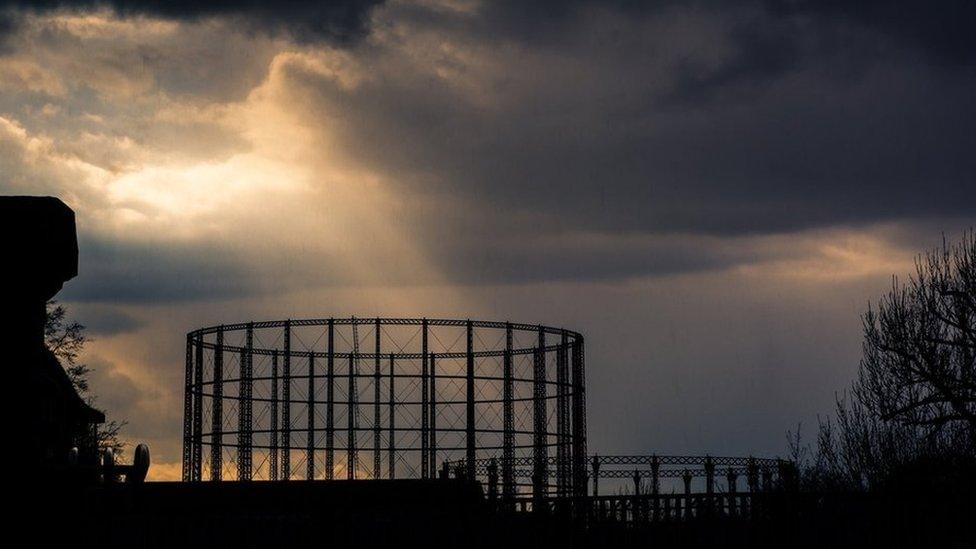Brexit 'could leave UK short of energy'
- Published
- comments

The UK has shut down much of its natural gas storage infrastructure in recent years
The UK would be vulnerable to gas supply shortages and price hikes after Brexit, an industry leader has warned.
Marco Alvera, head of European industry body GasNaturally, told the BBC that EU nations could restrict gas exports to the UK during winter cold snaps in order to prioritise their own citizens.
"We've spoken to several ministers and civil servants over the last two years. Energy has not been discussed enough."
The UK imports almost half the gas it consumes via pipelines from Europe.
Some 39% of the UK's electricity supply was generated from natural gas last year, according to official government statistics, external.
"I would make [energy security] a high priority point in the discussions, and I haven't seen it be like that," said Mr Alvera, who is also the chief executive of Italian gas pipeline company Snam, which owns a minority stake in one of the two main UK-Europe gas pipelines.
He added that EU nations would also theoretically have the ability to impose tariffs on their gas and electricity exports to the UK post-Brexit.
Russian gas
The UK has become overly dependent on imported natural gas to meet its winter fuel needs, Mr Alvera warned.
He said this was because the UK's own North Sea gas supplies had wound down, while at the same time the country had shut down much of its gas storage infrastructural capacity.
"We see one of the consequences of global warming is more extreme temperatures in the summer and in the winter," he told the Business Daily programme on BBC World Service radio.
"In the week when we had the 'Beast from the East' very cold spell coming, the system was already under a lot of strain, and the UK was taking a lot of gas from Europe that was stored in Europe."

Where does the UK's gas come from?
UK domestic production: 44%
Liquefied natural gas (LNG) imports: 9%
European pipelines: 47% (of which 36% comes from Russia and 21% from Norway)
Data as of 2017. Source: British Gas, external

The UK could remedy the situation relatively easily, he said, by converting old exhausted North Sea gas fields into gas storage facilities.
Mr Alvera also claimed that much of the UK's gas imports originated from Russia, having been piped across the rest of Europe.
The extent of UK reliance on Russian gas has been a source of controversy since the Novichok poisonings in Salisbury in March last year.
Less that 1% of UK gas consumption last year came directly from Russia as liquefied natural gas imports.
However the ultimate source is of the UK's piped gas imports is harder to determine, with one estimate finding that 36% of it ultimately came from Russia in 2017.
Lords report
The warning echoes the findings of a 2017 House of Lords report, external, which said that the UK could be "more vulnerable to supply shortages in the event of extreme weather or unplanned generation outages".
The risk would arise upon the UK's exit from the EU's Internal Energy Market, which would potentially take place at the end of the transition period on 31 December 2020 under the terms of the Withdrawal Agreement negotiated with the EU.
In the case of a no-deal Brexit, the UK would be at risk immediately upon leaving the EU.
The bulk of the UK's natural gas imports come via Norway, external, which is part of the Internal Energy Market, although it is not an EU member.
The Lords report also concluded that it was possible, but "unlikely that tariffs will be applied to UK-EU trade in gas and electricity post-Brexit, even in the event of a no-deal scenario.
"However, the energy industry could be affected by tariffs on products used in the construction and maintenance of the energy system."